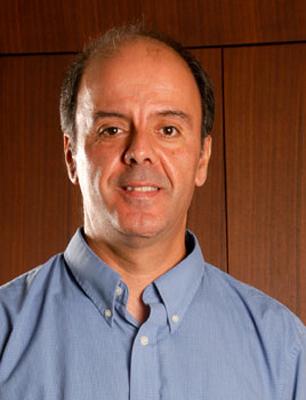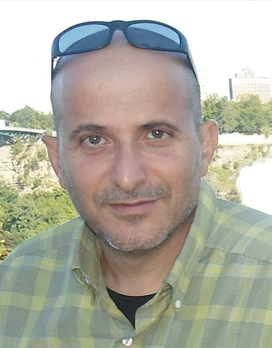


Professor Mounir Boukadoum, PhD.
Laboratoire Microélectronique-Prototypage,
University of Quebec at Montreal (UQAM)
Title:
Plagiarizing Nature for Engineering Analysis and Design
Abstract:
Systems composed of multiple integrated processors and sensors, with the ability to autonomously satisfy their energy needs
and intelligently adapt to their environment are becoming a reality. This example of system complexity brought forth by current
technological advances has created analysis and design problems that were either marginal or ignored in the past. Given the
increasingly shorter design cycle and lifespan of the end products, the current formal tools for system design and analysis
are often overwhelmed by these new problems, when not out of scope. This is not the case in Nature where complex systems are
common and have been dealt with successfully by an approach on pragmatism and self-preservation, as opposed to logic and/or
analytical models. This very slow process at the human scale has produced remarkable results in Nature, although often offering
suboptimal solutions and limited explanatory capacities in comparison to formal approaches. After discussing the limitations of
current formal thinking with respect to complexity, the talk with outline today's computational intelligence paradigms, followed
by illustrative applications using neural networks, fuzzy logic and evolutionary algorithms.
Short Bio:
Mounir Boukadoum is professor of microelectronics engineering at The University of Quebec at Montreal (UQAM), Canada. He studied
physics in Algeria before switching to electrical engineering in the United States, with an emphasis on biomedical applications.
He holds a PhD degree in Electrical Engineering degree from The University of Houston, Texas. His current research covers the
applications of artificial intelligence and nature-inspired techniques to solve analysis and design problems, particularly in
relation to biomedical outcomes. Pr. Boukadoum is currently director of the Design and Fabrication of Microsystems research laboratory
at UQAM (COFAMIC), president of the IEEE Computational Intelligence Society's chapter in Montreal and executive member of the Quebec
Strategic Alliance for Microsystems research consortium (ReSMIQ). He is an active member of IEEE and member of three IEEE CAS conferences
steering committees. He is also a cofounder of the IEEE NEWCAS conference and Co-Chair of the 2018 edition in Montreal.

Professor Ferhat Khendek, PhD.
Department of Electrical & Computer Engineering,
Concordia University
Title:
Model Based Software Management
Abstract:
Model Driven Engineering (MDE) is becoming a widely accepted paradigm for software development. However, very little has been achieved in software management, like software configuration, dynamic reconfiguration, upgrade, etc. In this presentation we will introduce and discuss the challenges of software configuration, dynamic reconfiguration, upgrade, especially under the constraint of high availability, a common requirement for carrier grade services. We discuss how model driven methods can help in tackling these challenges.
Short Bio:
Ferhat Khendek received his PhD from University of Montreal, Canada. He is a full professor in the department of Electrical and Computer Engineering of Concordia University where he also holds since 2011 the NSERC/Ericsson Senior Industrial Research Chair in Model Based Software Management, a major collaboration between Ericsson and Concordia University. Ferhat Khendek's research interests are in model based software systems engineering and management, formal methods, validation and testing, and service engineering and architectures

Professor Reda Alhajj, PhD.
Title:
Advanced Technology and Social Media Influence on Research, Industry and Community
Abstract:
The rapid development in technology and social media has gradually shifted the focus in research, industry and community from
traditional into dynamic environments where creativity and innovation dominate various aspects of the daily life. This facilitated
the automated collection and storage of huge amount of data which is necessary for effective decision making. The value of data
is increasingly realized and there is a tremendous need for effective techniques to maintain and handle the collected data starting
from storage to processing and analysis leading to knowledge discovery. This talk will focus on techniques and structures which
could maximize the benefit from data beyond what is traditionally supported. We emphasize data intensive domains which require
developing and utilizing advance computational techniques for informative discoveries. We describe some of our accomplishments,
ongoing research and future research plans. The notion of big data will be addressed to show how it is possible to process
incrementally available big data using limited computing resources. The benefit of various data mining and network modeling
mechanisms for data analysis and prediction will be addressed with emphasize on some practical applications ranging from forums
and reviews to social media as effective means for communication, sharing and discussion leading to collaborative decision making
and shaping of future plans.
Short Bio:
Reda Alhajj is a professor in the Department of Computer Science at the University of Calgary. He published over 500 papers in
refereed international journals, conferences and edited books. He served on the program committee of several international conferences.
He is founding editor in chief of the Springer premier journal "Social Networks Analysis and Mining", founding editor-in-chief of
Springer Series "Lecture Notes on Social Networks", founding editor-in-chief of Springer journal "Network Modeling Analysis in Health
Informatics and Bioinformatics", founding co-editor-in-chief of Springer "Encyclopedia on Social Networks Analysis and Mining", founding
steering chair of the flagship conference "IEEE/ACM International Conference on Advances in Social Network Analysis and Mining", and
three accompanying symposiums FAB, FOSINT-SI and HI-BI-BI. He is member of the editorial board of the Journal of Information Assurance
and Security, Journal of Data Mining and Bioinformatics, Journal of Data Mining, Modeling and Management; he has been guest editor of a
number of special issues and edited a number of conference proceedings. Dr. Alhajj's primary work and research interests focus on various
aspects of data science and big data with emphasis on areas like: (1) scalable techniques and structures for data management and mining,
(2) social network analysis with applications in computational biology and bioinformatics, homeland security, etc., (3) sequence analysis
with emphasis on domains like financial, weather, traffic, energy, etc., (4) XML, schema integration and re-engineering. He currently
leads a large research group of PhD and MSc candidates. He received best graduate supervision award and community service award at the
University of Calgary. He recently mentored a number of successful teams, including SANO who ranked first in the Microsoft Imagine Cup
Competition in Canada and received KFC Innovation Award in the World Finals held in Russia, TRAK who ranked in the top 15 teams in the
open data analysis competition in Canada, Go2There who ranked first in the Imagine Camp competition organized by Microsoft Canada,
Funiverse who ranked first in Microsoft Imagine Cup Competition in Canada.